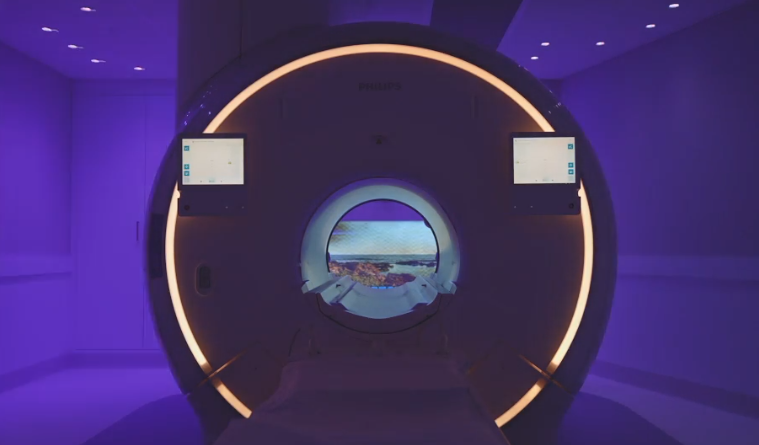If you’re experiencing hip pain, an MRI scan may be the best way to determine the cause.
MRI scans are a non-invasive way of diagnosing problems with the hip joint. They use a powerful magnetic field and radio waves to create images of the inside of the body. This information can help your doctor determine if you have a labral tear, femoral head necrosis, articular cartilage damage, or other problems that need treatment.
Getting an MRI scan early on can help prevent further damage to the hip joint and make treatment more effective.

How do Hip MRI scans work?
A hip MRI, also known as magnetic resonance imaging, uses a strong magnet to generate detailed images of the hip joint. You can use it to diagnose issues such as labral tears, stress fractures, and hip fractures. In a hip MRI, the patient lies on their back while the device rotates around them. The magnet helps to align the hydrogen atoms in the body, producing clear images of structures such as the femoral head and acetabular labrum. Additionally, a contrast dye may be injected to highlight specific areas for better visualization, such as tears in hyaline cartilage or abnormalities at the femoral head neck junction. But contrast dye isn’t always necessary; your doctor will determine if it’s needed for your specific case.
Why might you need a hip MRI?
A hip MRI, or magnetic resonance imaging, is a useful tool for diagnosing potential issues in the hip joint. The scan can detect a cam lesion, which is an irregularity on the femur that can lead to pain and difficulty with mobility. It can also reveal cartilage tears, osteoarthritis, and inflammation in the joint. These conditions can often be misdiagnosed using other imaging techniques, so a hip MRI may be necessary in order to get an accurate diagnosis and determine the best course of treatment. In some cases, a hip MRI may also be used to monitor the progress of a current injury or condition over time. This specialized scan can provide important insight into hip health and ensure that patients receive appropriate care.
How to prepare for your hip MRI?
MRI scans are generally safe and well-tolerated by patients. However, you can do a few things to prepare for your scan and make sure it goes smoothly. First, it’s important to wear comfortable clothing with no metal fasteners, as these can interfere with the magnetic field. You should also remove any jewellery, belts, or other metal items. If you have long hair, it’s a good idea to tie it back in order to keep it from obscuring the images. Finally, be sure to let your doctor know if you’re pregnant or breastfeeding, as the magnetic field could pose a risk to the developing fetus or infant.
What To Expect from an MRI scan of your Hip
During the scan
During the scan, you will lie on your back on a table that slides into the MRI machine. The table is usually padded for comfort and has straps to help you stay in place. Once you’re inside the machine, the technician will give you earplugs or headphones to protect you from the loud noise the machine makes as it creates the images. You may also be given a contrast dye through an IV to help improve the quality of the images. The dye can make you feel warm or hot all over, but this sensation is temporary and will go away once the scan is complete.
After the scan
After the scan, you can return to your normal activities. There are no side effects from the MRI itself, though you may experience some side effects from the contrast dye if you were given one. These side effects, such as nausea and vomiting, are usually mild and go away quickly.
What are the benefits of an MRI scan of the hip?
Several benefits of having an MRI scan of the hip include:
-
The ability to see all structures around the hip joint
-
The ability to detect early signs of disease
-
The ability to assess damage after an injury
-
No needles or injections required
-
Can be done on people of all ages
-
MRI scans of the hip are painless and have no known side effects
These are just a few of the benefits of having an MRI scan of the hip. If you are experiencing any pain or problems with your hip, talk to your doctor about whether an MRI scan is right for you.


